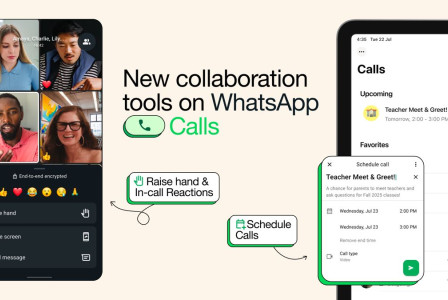SEARCH
The dangers behind Gen Z's favourite series and platforms

SHARE IT
From Naruto to Attack on Titan, cybercriminals are increasingly using anime and other beloved Gen Z shows and movies as bait. In a new report looking at the period from the second quarter of 2024 to the first quarter of 2025, Kaspersky identified over 250,000 cyberattacks posing as popular anime among other shows and streaming platforms favored by young audiences. To help Gen Z understand these and other cyber risks, Kaspersky is launching "Case 404" - an interactive cybersecurity game that will teach them how to protect their online privacy.
For many members of Gen Z, streaming is more than a hobby, it's a lifestyle that provides a connection to the characters, worlds and fandoms that define their identity. From anime to nostalgic movie marathons, Gen Z's relationship with the screen is special. This unique connection creates a paradox: the more emotionally involved the viewer is, the easier it is to fool them, and Gen Z's enthusiasm proves dangerous.
Over 65% of Gen Z regularly watches anime, making it the most anime-obsessed generation in history. For the analysis, Kaspersky experts selected five popular anime titles among Gen Z: Naruto, One Piece, Demon Slayer, Attack on Titan and Jujutsu Kaisen. Kaspersky identified 251,931 attempts to deliver malware or unwanted files appearing under the names of these anime titles. Cybercriminals are exploiting the relationship Gen Z has with these series, often using lures such as "exclusive episodes", "leaked scenes" or "premium access".
Among anime titles, Naruto ranked first, despite first airing more than two decades ago. During the reporting period, it was used as bait in 114,216 attempted attacks. Demon Slayer followed with 44,200 attack attempts. Its meteoric rise in recent years, boosted by viral moments and a growing global player base, has made it a natural target for cybercriminals looking to exploit the wave of publicity. Meanwhile, Attack on Titan - a longtime favorite game - ranked third with 39,433 detected attempts to distribute malicious content.
In addition to anime, Kaspersky also analyzed five iconic movies and series that continue to resonate with Gen Z: Shrek, Stranger Things, Twilight, Inside Out 2 and Deadpool & Wolverine. These series alone accounted for 43,302 attack attempts with a sharp increase in cybercriminals' attention to these titles in early 2025. This is primarily tied to the increase in Shrek attacks, with over 36,000 attempts in total and a sharp increase in March 2025, double the 2024 monthly average.
Platforms such as Netflix, Amazon Prime Video, Disney+, Apple TV Plus and HBO Max have reshaped movies, series and anime watching into an immersive, on-demand experience that meets Gen Z's need for personalized content and storytelling on a global scale. However, this has also created fertile ground for cybercriminals. Kasperskyidentified 96,288 attempts to distribute malicious or unwanted files disguised in the names of these major streaming platforms. Unlike seasonal trends, streaming platforms offer a constant stream of content, from highly anticipated premieres to hidden gems that viewers discover months or even years after their release.
When examining the streaming services most commonly used by cybercriminals, Netflix stood out by far, as it was involved in 85,679 attack attempts and was linked to over 2.8 million phishing pages that mimicked its brand. Cybercriminals exploit popularity, global reach and frequent subscription-based activity. They mimic login pages, share "free trial" links or forge password reset emails, knowing full well how important a role Netflix plays in Gen Z's digital life.
As Generation Z's daily life becomes inextricably linked to streaming platforms, forums and fan communities on social media, cyber threats are evolving to echo their interests. To address this challenge, Kaspersky has launched an interactive online game, 'Case 404', designed specifically for Gen Z. "Case 404" challenges players to become cyber detectives and solve compelling cases of cyber "crimes". Through this digital adventure, Kaspersky not only highlights the dangers, but helps Gen Z develop the thinking and skills to stay safe in an increasingly evolving online world. As a reward for completing the game, participants receive a discount on Kaspersky Premium, providing them with reliable tools they need to navigate the digital world safely.
To watch your favourite entertainment programmes safely, Kaspersky recommends:
- Check out Kaspersky's interactive online game Case 404, designed specifically for Gen Z to learn how to stay safe in an increasingly vulnerable online landscape.
- Always use an official, paid subscription when accessing streaming services and make sure to use apps from official sites.
- Always verify the authenticity of websites before entering any personal information. Stick to trusted, official websites when watching or downloading content and double check URLs and spelling of company names to avoid phishing sites.
- Be careful about the file extensions you download. Video files should not have .exe or .msi extensions - these are usually associated with harmful programs.
- Use a reliable security solution, such as Kaspersky Premium, to detect malicious attachments that could compromise your data.
- Ensure safe web browsing and secure messaging with Kaspersky VPN, protecting your IP address and preventing data leakage.
MORE NEWS FOR YOU

 Help & Support
Help & Support 

